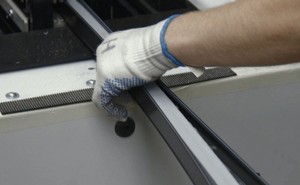In building houses, emphasis is increasingly put on sustainability. Good roofing and wall insulation, double or triple glazing, these are just a few of the many options. But window profiles also make a significant contribution in this area.

Noryl - a solid competitor for polyamide, ABS and PVC
The right choice of window profiles has a significant impact on the energy efficiency of a home. Until a few years ago, aluminium profiles were invariably no match for wooden or PVC frames. That’s now in the past thanks to the creation of a thermal barrier. This ensures that the mutual influence of the indoor and outdoor temperature is minimal. That makes for pleasant warmth in the house in winter and agreeably cool temperatures in summer.
The thermal barrier is created by positioning a plastic strip between two aluminium extrusions. These may be strips of polyamide, ABS or PVC. There is a fourth possibility, less well known but no less useful; quite the contrary. We’re talking about Noryl.
Registered trademark
Noryl is a family of plastics based on polyphenylene ether and polystyrene in various combinations. It was first developed in 1966 by General Electric Plastics (GEP). Today it is a registered trademark of SABIC (Saudi Basic Industries Corporation), the Saudi Arabian world player that acquired GEP in 2007.
This plastic is mainly used in the (petro)chemical processing industry, in electrical housings and switches, medical applications, automobile parts and building components. Perhaps the most well-known use of Noryl was when it was used for the housing of the Apple II computer. In a fire, the plastic convincingly proved its heat resistance. After extinguishing the fire, when the computer was found, the casing was almost melted, but not completely. After cooling, the housing was removed and, guess what? The motherboard still worked perfectly! Afterwards Steve Jobs and Co built an entire advertising campaign around it.
Outstanding insulator
By adjusting the dosage of the components (polyphenylene ether and polystyrene), Noryl's properties can be optimized for the desired application. Noryl GTX for example, is a version that is ideally suited for use as a thermal barrier in window profiles. It is extremely light, very strong, has very low moisture absorption, an exceptionally low thermal expansion and is very easy to process. However, the main feature of these Noryl GTX strips is that they provide excellent thermal insulation. In this way, aluminium frame profiles are able to easily compete with their wooden and PVC counterparts.
- Peter De Roovere



Leave a comment